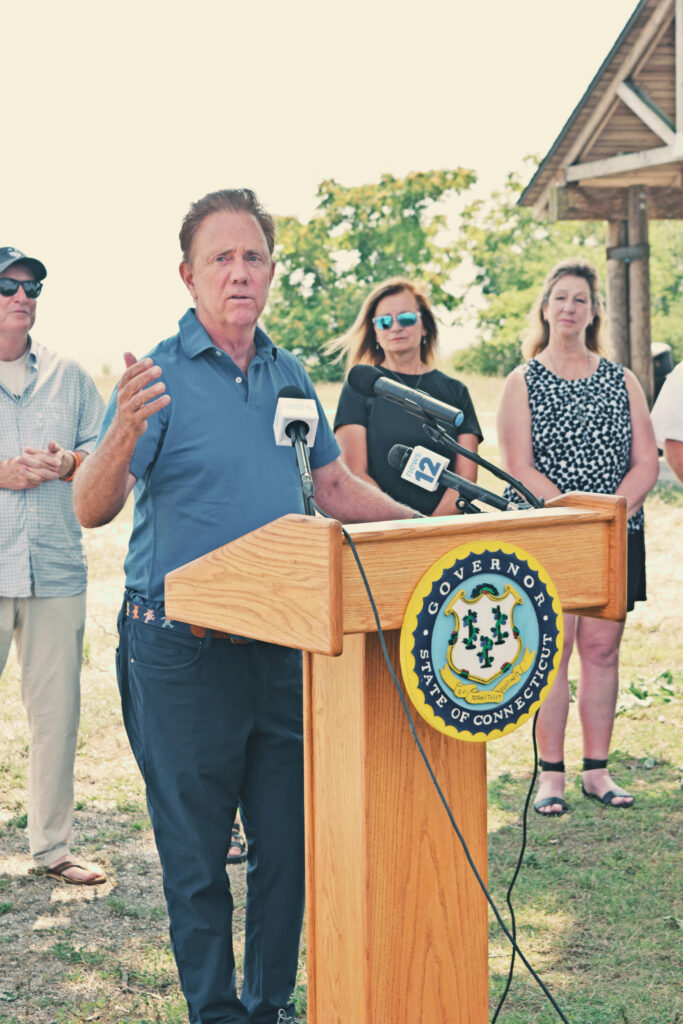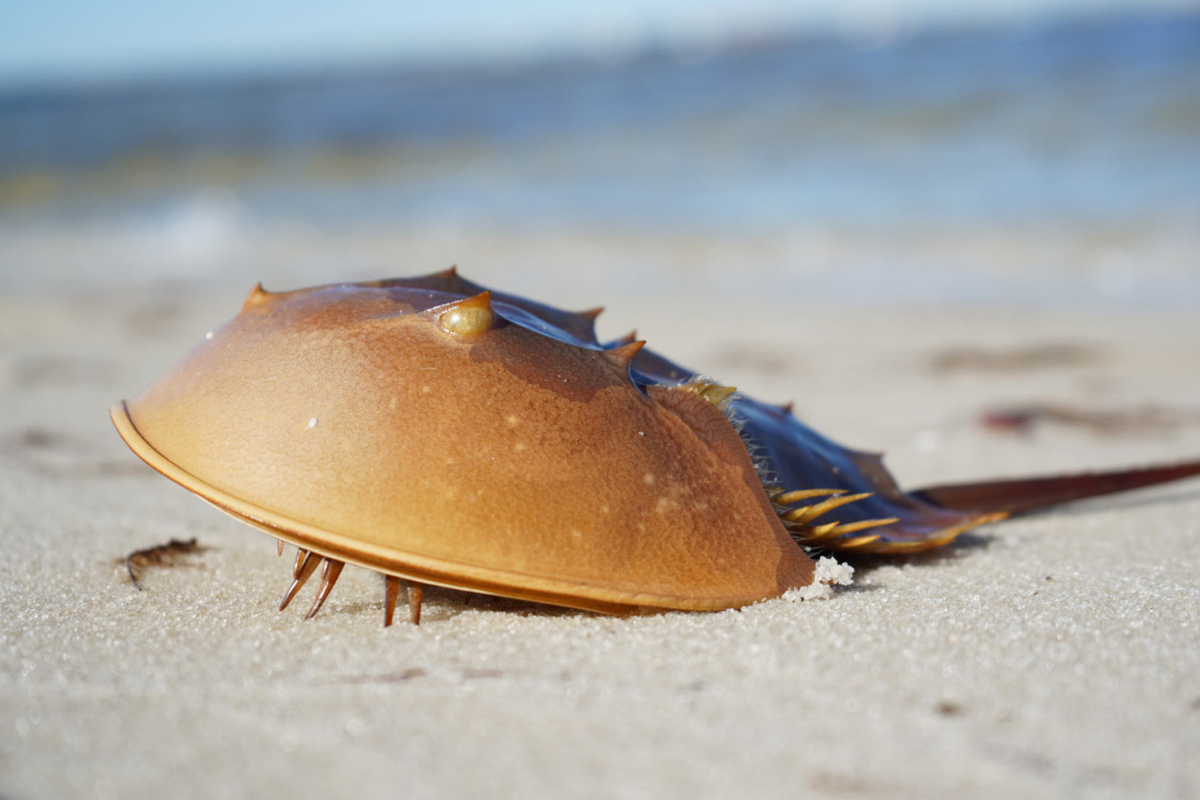Connecticut state rep. Joe Gresko (D-Stratford) first became enamored by horseshoe crabs as a kid while watching them “right” themselves with their tails at Short Beach in Stratford.
So, it was fitting that he stood alongside Gov. Ned Lamont at Short Beach on Wednesday morning during a bill signing ceremony for HB 6484, An Act Concerning Certain Harvesting of Horseshoe Crabs.
The legislation, which Friends of Animals helped draft and was championed by Gresko, prohibits the hand capture and killing of these ancient mariners from the waters and shoreline of the state.
“I am really proud to be able to do this today. Horseshoe crabs are part of the ecosystem that we have,” Lamont said before the signing the bill, which goes into effect Oct. 1.
“Horseshoe crabs are pretty hardy. They predated the dinosaurs, and they’re still here after the dinosaurs. They can survive just about everything—except for perhaps, manmade harvesting. And what’s going on can potentially render them extinct.

“And what that means broadly in terms of biodiversity, what that means in terms of allowing our birds to proliferate. What they need to be able to eat, that is part of the cycle of life. Horseshoe crabs are important.”
Migratory birds need to eat horseshoe crabs’ eggs, especially the threatened red knot. In 2021, fewer than 7,000 red knots were found in Delaware Bay, a key spring stopover habitat. That’s less than a third found in 2020. And red knot numbers remained at historically low levels in 2022.
Without sufficient horseshoe crab eggs to feed on, migratory birds run out of energy and die before reaching their breeding grounds. Horseshoe crabs are also an important source of food for other wildlife such as sea turtles, and species such as anemones, barnacles, oysters and seaweed use horseshoe crab shells as homes.
The Atlantic Marine Fisheries Commission downgraded the stocks of horseshoe crabs in the NY region, which includes Connecticut and the Long Island Sound, from Neutral to Poor in 2019.
Gresko said that he hopes this legislation will inspire our other neighboring states along the Atlantic seaboard to step up and protect horseshoe crabs.
New Jersey banned the killing of horseshoe crabs for bait in 2008. And just last week the U.S. Fish and Wildlife Service halted the commercial harvest of horseshoe crabs in Cape Romain National Wildlife Refuge in South Carolina during the crabs’ spawning season, recognizing that the practice is incompatible with the purposes of the refuge and the mission of the National Wildlife Refuge System. This decision marks the first time a federal agency has curtailed the crab harvest because of its impact on the red knot.
“Friends of Animals will be working on getting legislation introduced in New York next year,” said Priscilla Feral, president of Friends of Animals, adding that FoA is also assisting with efforts in Delaware. “I am proud to live in a state that is leading the nation when it comes to protecting horseshoe crabs and biodiversity. NY and Delaware can now have the courage to follow our effort in Connecticut. This victory is a testament to state Rep. Joe Gresko, who introduced the clear, concise bill and whose genuine love for these ancient mariners gave the bill the energy it needed.”
Rep. Gresko dedicated the legislation to the late Dr. Jennifer Mattei. Mattei was a member of the International Union for the Conservation of Nature’s Horseshoe Crab Specialist Group, who Connecticut was lucky to have as a biology professor at Sacred Heart University. Mattei founded Project Limulus, a citizen-science project examining the ecology of the Long Island Sound horseshoe crab population. Her work over the past two decades led us to this point, Gresko said.
Mattei’s husband Ivan was in attendance.
“We get our inspiration from people who walk the walk. In this case Prof. Jennifer Mattei and her 20-year work on Project Limulus was my inspiration,” Gresko said. “She alerted me to this issue. There are many individuals who have helped with this legislation, to get it over the finish line. Obviously, my colleagues in the General Assembly, but we also had help from Friends of Animals and the Clean Earth Project.”
Friends of Animals worked with Gresko to make the General Assembly understand that horseshoe crabs are already functionally extinct in Long Island Sound, which means they no longer play an effective role in their ecosystem, and that Connecticut needed to stop the reckless, unnecessary killing of horseshoe crabs for bait so people could eat smoked eel and conch fritters.
In addition to be used for bait, hundreds of thousands of horseshoe crabs are rounded up by pharmaceutical companies, drained of their blood to develop safe vaccines and medical devices, and returned to the ocean, after which many die.
However, we no longer need to use horseshoe blood because more than 20 years ago, scientists created a method to synthesize the compound found in horseshoe blood without involving horseshoe crabs. It has been approved in Europe, Japan and China for the exact same tests for which horseshoe crab blood is used in the United States.
FoA is also planning to press the federal government to make it more efficient and less expensive for biomedical companies in the U.S. to use the synthetic alternative to horseshoe crab blood.
Gresko pointed out that if we let our horseshoe crab friends be, “We have millions of years of evidence to show that they will be able to repopulate the Atlantic and the Long Island Sound.”
“By safeguarding horseshoe crabs, we strengthen our marine food web for generations to come,” he said.
“This summer has reminded us—don’t take the beauty of this beach, this ecosystem and what it means, for granted,” Lamont added. “We’ve been under some stress; that’s been really evident over the last several months in particular.”

